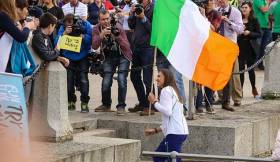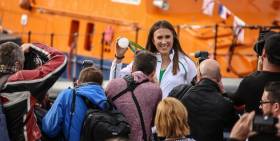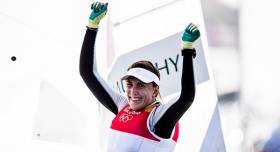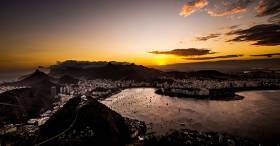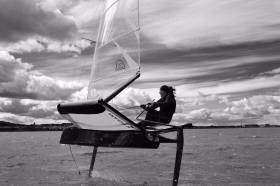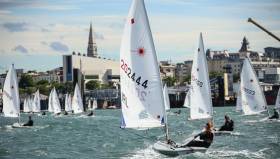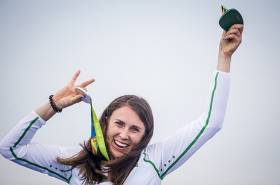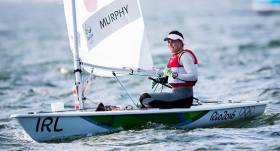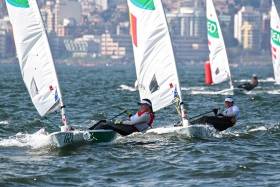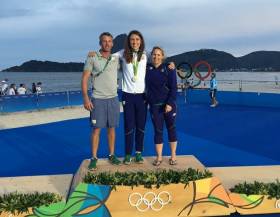Displaying items by tag: Annalise Murphy
Turning Rio Result Into Tangible Benefit for Sailing in Ireland
While Irish Sailing is rightfully basking in the reflected glory of last night's homecoming celebrations for Annalise Murphy and its Olympic Sailing Team there will also be one eye to the future, considering how to turn the positive Rio results into tangible benefits for the development of sailing in Ireland, not just in High Performance, but across every aspect of the sport.
There is no doubt that, in the modern sports world, medals mean money. An analysis of Sports funding in many developed countries shows that successful sports benefit from good results at World Championships and major Games.
In Atlanta in 1996, Britain finished 26th in the medal table (Ireland was 16th – entirely due to Michelle Smith) with a total of 15 medals from six sports. The improvement over the five intervening Olympiads to the 67 medals from 22 sports in Rio, is due to a variety of things, but perhaps most of all to the increased investment in sport aided by the introduction of the National Lottery. Sports with a plan, that medalled in Atlanta, benefitted the most, while the ones that lagged behind were given a boost by the increased investment occasioned by being the host nation for the 2012 games.
Sailing in the UK received £25.5m in the Rio Olympic cycle, the fourth highest funded sport after Athletics, Swimming and Cycling. Sailing in Ireland received €2.545m in High Performance funding, third place after Boxing and Athletics (figures exclude paralympic sports). It might also be argued that Ireland did better in terms of the cost per medal – the Irish Sailing silver medal cost €2.545m, while Britain's 3 sailing medals cost £8.5m each.
David O'Brien reports in the Irish Times that as Sport Ireland looks to fund the Tokyo 2020 squad, there is no doubt that Sailing and Rowing will enter the negotiations with the considerable clout that medals bring, but there will be a more forensic analysis of what led to success and whether the sport has a pipeline that will lead to sustainability of results on the international stage.
The ISA will be able to point to the potential shown in Rio as well as an impressive track record by ISA academy members at Youth Sailing Worlds and World and European Championships. There have been many significant results, not least World Youth Sailing bronze in the 420 in January and as recently as July, World Youth Silver in the Laser Radial.
Also under scrutiny, particularly in light of recent developments, will be whether the sport has robust governance, ensuring fairness and transparency, as well as a willingness to engage with the Irish Institute of Sport, an arm of Sport Ireland that played a leading role in the success in Rio. Irish Sailing passes these test as well, putting it in a very strong position to negotiate vigorously, not only for High Performance, but also for investment into the grassroots of the sport.
Click for more on last night's spectacular Olympic homecoming celebration on Afloat.ie
Annalise Murphy 'Sailing Bursary' Announced as Silver Medallist Welcomed Home at Dun Laoghaire
A flotilla of yachts and powerboats lead by Dun Laoghaire's RNLI Lifeboat welcomed Olympic silver medallist Annalise Murphy back to her home port of Dun Laoghaire on Dublin Bay this evening.
After the Dublin sailing star stepped ashore at a crowded section of the East Pier, the 26–year–old double Olympian was officially greeted by Transport, Tourism and Sport Minister Shane Ross, Dun Laoghaire's own Minister for Jobs Mary Mitchell O'Connor and Dun Laoghaire Rathdown Cathaoirleach Cormac Devlin.
Members of the Rio Olympic Sailing Team, Ryan Seaton and Matt McGovern, Andrea Brewster and Saskia Tidey along with Rio coaches James O'Callaghan and Rory Fitzpatrick accompanied Ireland's only sailing medal winner since 1980 to the near–by People's Park for a civic reception. The guest of honour said she was thrilled to have been given such a welcome home and hoped that her medal performance would inspire others to get involved in sailing.
Among the crowd waiting for her to step ashore were many sailors from Dun Laoghaire's four waterfront clubs but also from the network of over 100 sailing clubs across the country. Ireland's last Olympic medal winner David Wilkins, who won silver in 1980, was also there to greet Annalise.
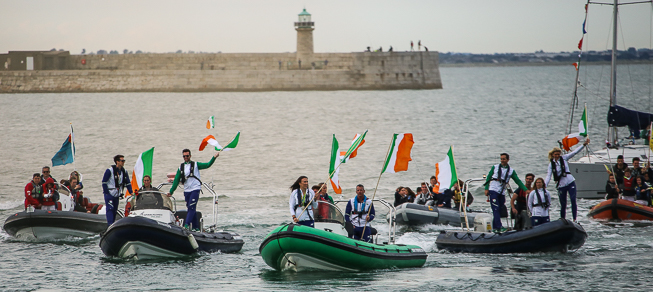 Annalise Murphy is escorted into Dun Laoghaire
Annalise Murphy is escorted into Dun Laoghaire
Minister Ross said 'I am delighted for Annalise, we all know how determined she was to bring home a medal, after coming so close four years ago this is a fantastic achievement for her. Bouncing back from the disappointment of finishing fourth in London 2012 to become European Champion in 2013 to now achieving a silver medal at the Olympics is a wonderful endorsement for what can be achieved through hard work and talent. She has been so determined and she is a fantastic role model for all young athletes'.

(Above and below) Annalise and her team mates arrive at the East Pier for a Civic Reception to honour the Olympic silver medal achievement in Rio. Photo: Afloat.ie
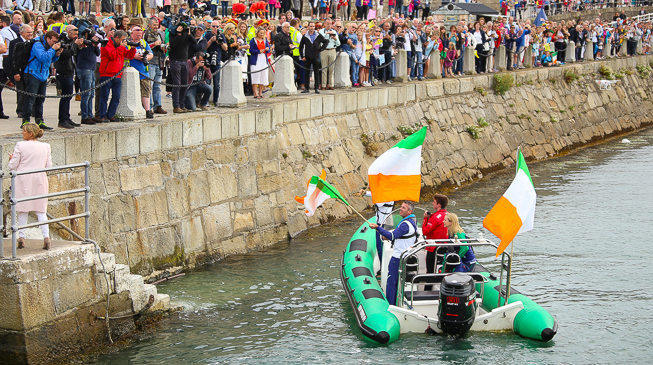
During the ceremony, the Cathaoirleach announced a new 'Annalise Murphy Sailing Bursary' of €5,000. The prize is a joint DLRCC / University College Dublin collaboration. It will be awarded annually to an outstanding young sailor who does not come from a 'traditional sailing background'. The bursary may be used to assist with third level education.
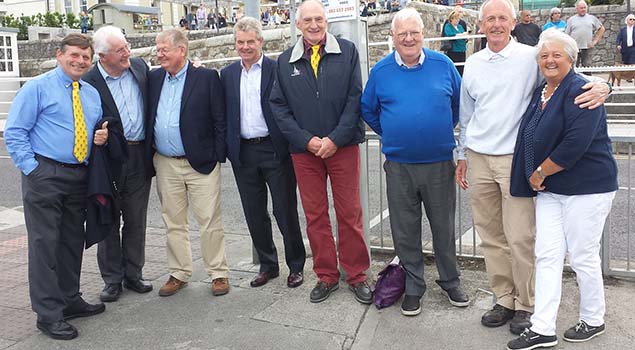 Dun Laoghaire sailors greeted the new Olympic silver medallist including this group from the Royal St. George with 1980 silver medal winner David Wilkins (pictured left) with Geoff O'Donoghue, Trevor Millar, Tamas Esze, Derek Jago, Louis Monks, Johnny Ross-Murphy and Gillian Wilkins Photo: Tony Brown
Dun Laoghaire sailors greeted the new Olympic silver medallist including this group from the Royal St. George with 1980 silver medal winner David Wilkins (pictured left) with Geoff O'Donoghue, Trevor Millar, Tamas Esze, Derek Jago, Louis Monks, Johnny Ross-Murphy and Gillian Wilkins Photo: Tony Brown
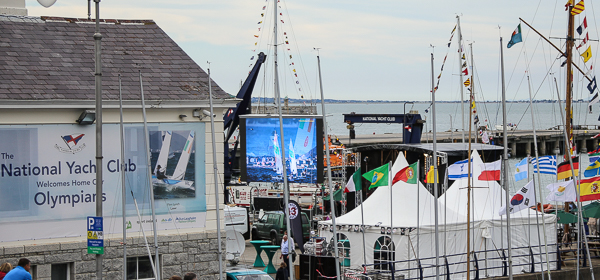 Annalise Murphy's National Yacht Club at Dun Laoghaire
Annalise Murphy's National Yacht Club at Dun Laoghaire
The family homecoming event featured a Brazilian Samba band, a dancing troupe, DJ, face painting, flags, balloons, and a boat display as part of the Irish Sailing Association's 'Try Sailing' Campaign.
Well done @Annalise_Murphy who was welcomed home today with her silver medal by lots of Dun Laoghiare fans pic.twitter.com/57rtLcwDk2
— Concorde Travel (@ConcordeSailing) August 25, 2016
Annalise and other Olympic heroes from Dun Laoghaire borough were interviewed on stage.
Annalise's welcome home party continued with a special reception at the National Yacht Club where she was made an honorary NYC life member by Commodore Larry Power. Photo gallery below by Joe Fallon.
Read also: Turning Rio Result Into Tangible Benefit for Sailing in Ireland
Sweet Rio-demption
A fourth place in her first Olympic campaign,
Left Annalise heartbroken, she couldn't hide the pain.
But our Irish Laser Radial Queen,
Immediately focused on twenty sixteen,
Brushed herself off and got back on her feet,
Showed the world she was more than that London defeat.
While the road to Rio wasn’t smoothly paved,
Murphy's passion and drive could not be waived.
Four years training in both sunshine and hail,
Perfecting her technique for the tricolour sail.
She started in Rio - a bullet in race one,
Irish hopes soared as her Olympic series begun.
Consistently staying in the top 3 all week,
Had us all on the edge of our tracker following seats.
Then it came to the final medal race day,
But bad weather postponed events in Guanamara Bay.
Murphy kept her cool for one more sleep,
While the nerves of her nation were all in a heap.
On Tuesday the light Rio sea breeze filled in,
allowing the Radial medal race to begin.
Three Olympic medals, five boats in the mix,
Murphy guaranteed Bronze with a finish ahead of boat six.
On the first leg Murphy magic began to spark,
Second place around the windward mark!
As Annalise sailed the course she made us even prouder,
Shouts at the TV back home got louder and louder.
Then she crossed the finish line with a big grin,
This time she'd done it - a silver medal win.
A 36 year medal drought in the bin,
Thanks to Annalise Murphy our Irish Sailing Olympian.
by Sharon Quigley
Speaking on Newstalk's Off The Ball radio programme last night Olympic silver medal winner Annalise Murphy explained the difference between now and the London Games was the amount of time she spent studying the course in Rio. The National Yacht Club sailor explained this gave her an advantage over competitors who hadn't been familiar with conditions in Guanabara Bay. She also says her memory for course configurations on the Bay also helped her enormously.
"I'd come in from sailing and I'd draw out all the race courses, what was working and what wasn't. We did like a pros and cons of each of the courses, where you would get caught out and where we could make gains. Then, I printed them all off and laminated them to bring them all out. Everyday before racing we could go through each of the race courses and look at what was going to come up on the day. That's how I think I ended up with this medal."
A podcast of the radio show is on the Newstalk website here.
Annalise Murphy will be given a civic reception tomorrow in Dun Laoghaire. Details here.
The President of the governing body of International Sailing has spoken about the possibility of a foiling boat in the OIympic Sailing line–up for Tokyo 2020. In a far reaching interview with Scuttlebutt's Craig Lewick, World Sailing's Carlo Croce also says that sailing is one of six sports under review for the 2020 Games. It looks certain therefore that there will be changes in the sailing classes, something World Sailing, according to Croce, is hoping to keep to a minimum as the International Olympic Committee (IOC) looks for 'spectacular' events.
'I think in November we will be able to announce good news to the Council, but at the moment we’re still confidential because the IOC has not yet formally decided. Maybe kiteboard, maybe foiling boat… I don’t know. Perhaps an old hobby of mine – a long distance race with very simple and basic one design boats with no extreme equipment', Croce said.
The choice of a foiling boat, such as the Moth class, might be looked on favourably by Ireland as Olympic silver medalist Annalise Murphy, in the Laser Radial class, is also a keen foiling dinghy sailor. Annalise has already finished second in the Women's world Moth championships, a pioneering international foiling class with 15 boats sailing in Ireland.
'We decided to ask our members to vote for what we call the unlock vote, which meant we had to unlock the decision taken four years ago to keep the same Olympic events from the 2016 Games to the 2020 Games. We were pushed hard by the IOC to move forward to a more spectacular program, and they just give you – very quickly – two figures: 10,500 athletes in Rio and in London. This is the number they don’t want to change. There will be five new sports in Tokyo and six current sports under review, not for pushing them out, but to look what they can do for improving, and sailing is amongst the six' said Croce.
Croce also told Scuttlebutt 'We could pick up one man and a girl and put them in an offshore boat… just a personal thought. I am completely convinced we’d find someone who can find provide the boats to the Olympics free of charge. It could also be a way for people competing in a dinghy class to also participate in the offshore race and compete for two medals, which our sport never had. That could be interesting'.
But nothing is decided. It’s not me who will decide; it will be the Council. Certainly there will be changes, but what I want to really say is we will do absolutely the minimum changes we can not to have people throwing away all of their boats and our member nations being in trouble. So the changes yes, but just the minimum we need to. Our member nations have to design a program of four years, so we need to be quick.
Read the full interview on Scuttlebutt here.
Annalise Murphy will be given a civic reception tomorrow in Dun Laoghaire. Details here.
Dublin Bay Sailing Club's 2016 end of season race, an important occasion in the Club’s racing calendar, has been rescheduled to this Wednesday (August 24th) to allow Dublin Bay sailors participate in Annalise Murphy's special homecoming reception at the People's Park in Dun Laoghaire.
The Dublin Bay sailor won an Olympic silver medal in Rio 2016 in the Laser Radial class and will be welcomed back to the borough on Thursday evening from 6pm.
DBSC Commodore Chris Moore says he wants to give members the chance to 'participate in this remarkable tribute to this illustrious member of the Dublin Bay sailing community'.
The Water Wags, who race each Wednesday in the harbour have asked boats transiting the harbour to respect the Wag race. 'Please ask yachts under power to avoid creating excessive washes', a Wag spokesman said.
Dun Laoghaire Rathdown County Council and the Irish Sailing Association are planning a major celebration of Annalise Murphy's Olympic Silver medal in the Laser Radial class. A civic reception for the Irish Olympic Sailing team will take place in Dun Laoghaire, Annalise's home port this Thursday, (25th August 2016).
Plans are underway to give the Dun Laoghaire sailing star a major homecoming celebration that will start with a flotilla arrival at Dun Laoghaire harbour before proceeding to a public event at Dun Laoghaire's nearby People's Park, close to the East Pier. The reception will be staged from 6.30pm – 8.00pm.
Annalise will be officially welcomed home by An Cathaoirleach of Dún Laoghaire-Rathdown County Council Cormac Devlin.
The Homecoming in the People’s Park will host a big stage & screen and will feature a Brazilian Samba band, a dancing troupe, DJ, facepainting, flags, balloons, boat display and possibility of an icecream or two, say DLRCoCo.
Ireland's newest Olympic silver medalist arrives home to a hero's welcome. pic.twitter.com/ZZk4BrXaPf
— Newstalk Sport (@NewstalkSport) August 23, 2016
In what will be an important acknowledgment of Murphy's crowning achievement, the country's largest racing club, Dublin Bay Sailing Club (DBSC) has rescheduled Thursday's end of season race for up to 300 boats and over 1,000 sailors on Dublin Bay to allow sailors participate in the homecoming event.
After the civic reception, National Yacht Club Commodore Larry Power will bestow Honorary Life Membership of the National Yacht Club to 26–year–old Annalise for her Rio achievement, Ireland's first Olympic sailing medal in 36 years.
Ireland’s young sailors to welcome Annalise Murphy
The Irish Sailing Association is making a special appeal for junior and youth sailors from across the county–and country– to attend on Thursday evening to help form the welcome party for Annalise and her team. Sailing club colours and flags are especially welcome.
The Silver medal won by Annalise marks not only her efforts for London 2012 when fourth overall was both a disappointment for her as well as being the best Irish result in decades, but also the reconstruction of her campaign for Rio 2016 that saw her become an all-round performer in what is now regarded as one of the most challenging Olympic regatta venues ever. From the opening race of her series, she held a top-three result through the ten-race qualification series.
Annalise Murphy won Ireland’s first Olympic Sailing medal for 36 years at Rio 2016 and the result marks her reward for eleven years of dedication and intensive campaigning.
“I am incredibly happy with my medal. It has been a long road to achieve this, especially since London 2012 but it has been hugely worthwhile,” said Annalise Murphy. “My hope is that this medal represents an opportunity for Irish sailing to attract new people to our sport which is ideal for this island nation".
Team members
Finn Lynch (20) from Carlow and also a National YC sailor was the youngest ever Olympic helm to represent Ireland as well as being the youngest in his 46-strong class. He achieved several notable performances during his ten-race series at Rio including several top 20 results. In an event where the average age of the top ten finishers is 30, he has proven his ability with an Olympic experience under his belt and is certain to be a prospect for Tokyo 2020.
Andrea Brewster and Saskia Tidey from the Royal Irish YC started their campaign together exactly three years ago and sailed the 49erFX class for the new Women’s Skiff event at Rio 2016. After overcoming a three-month injury hiatus to their campaign, they qualified Ireland for the event earlier this year and their form improved steadily in the build-up to the Olympics. Over their 12 race series, they achieved five top ten results and ended their debut Olympic Games in 12th place overall.
Ryan Seaton and Matt McGovern, from Carrickfergus Sailing Club, Ballyholme YC & Royal Ulster YC were the last of the six Irish sailors into action on Guanabara Bay on Thursday afternoon in the Men’s Skiff event Medal Race final. The London 2012 veterans improved on their performance from four years ago by qualifying for the final to place tenth overall. Their results included two race wins in which they beat the four times world champions and eventual Gold medal winners. This ensured they were within reach of the podium going in to the last day of fleet racing.
“This result proves that our strategy in high performance is working and is providing the success that all involved in sailing and sport crave,” commented David Lovegrove, President of the Irish Sailing Association. “I want to acknowledge the tremendous professionalism of our coaching staff who have demonstrated such passion and commitment to our sailors. In particular I want to commend James O’Callaghan’s leadership and guidance of high performance sailing, ably supported by Rory Fitzpatrick.”
“Annalise’s medal confirms the intent of our programme that both delivers the highest standard of performance but also makes a return to our domestic sport,” said James O’Callaghan, ISA Performance Director.
Idea to Purchase Annalise's Silver Medal Winning Dinghy Gathers Pace
Afloat.ie's idea to purchase Annalise Murphy's silver medal winning Laser dinghy supplied by the Olympic race organisers is gathering pace.
Writing in his Sailing on Saturday blog, W M Nixon said how about bringing Annalise’s Rio Laser home for permanent display in the National Maritime Museum? It could usefully show visitors one of the greatest sailing dinghy designs of all time, and it would commemorate a great Irish sailing success.
Then too, it would be very useful to have that little boat around the place when the National Yacht Club (founded 1870) celebrates its Sesquicentennial in 2020, when we can only hope that Irish sailing will be having as good a time at the Tokyo Olympics, seeking fair play for a minority sport from a small country, as they did in Rio.
Writing in the Irish Independent this morning, Jim Cusack takes up the idea as he unveils National Yacht Club plans to welcome home Annalise with an NYC flotilla.
Annalise Murphy Gives Ireland's Olympics The Silver Sheen
Annalise Murphy’s Silver Medal has re-focussed sailing’s thinking about the Olympic Games, which tend to be perceived in many ways. It’s understandable that some specialist sportsmen see the Games as a monster which consumes energy which could be better deployed in other ways. Yet what’s the alternative? We live in a globalised age of instant and total communication, hungry for entertainment. To feed this voracious need for sport and spectacle, if the Olympics didn’t exist, then they’d have to be invented. W M Nixon admits he has always regarded the five ring circus with mixed feelings. Yet he readily argues in favour of the promotion and development of the Olympic Games, and their special value for a minority sport like sailing in a small nation like Ireland.
For maybe four weeks of every fourth summer, we are all Olympic fanatics. Then the monster is put back in its cage, and only the truest devotees, the dedicated fanatics, continue to work, plan, think and train, train, train towards the next Games, and the Games beyond that, and the Games beyond that again.
Certainly it’s elitist. And expensive. The remarkable British medal haul from the 2016 Games has shown what can be done with a heavily financed programme which rewards success while ruthlessly eliminating those who aren’t showing themselves capable of achieving the required standard.
Far from being a celebration of amateur sport, it has become a festival of professionalism at the highest level. Yet it has reached to such a level of specialized focus that an extraordinary level of camaraderie develops among the athletes. The way to the games is a long and often lonely path, and only one Olympic athlete can truly understand what his or her competitors have been through simply to be there.
Thus although some other sports such as international professional football can be reasonably if cynically seen as an acceptable substitute for war, the extraordinary thing is that, in its own odd way, the Olympics transcend this. There truly is such a thing as the Olympic Ideal of international goodwill, and it is alive and well even if it is sullied by some jingoistic supporters who use the Olympic success of a dedicated corps of athletes for the crudest nationalistic bombast.
The special nature of the trans-national relationships and friendships between Olympic athletes, and with their supporting teams – sometimes only very few in number – of coaches, trainers, technologists, sports psychologists, nutrionists and whatever, sets them apart from the remoter upper areas of sports administration. And when you’re battling on the front line of top-level sailing, you know that ultimately you must find your own path to success.
It was that and many other factors which contributed to the achievement by Annalise Murphy of Ireland’s Silver Medal for sailing. It was won last Tuesday off Rio de Janeiro after a short but tense race through which the nation held its breath while the sailor from the National Yacht Club emerged successfully from a brief gladiatorial contest. It was a contest which could just as easily have seen her lose the Bronze Medal points position she’d held going into this final double-scoring ten boat race of the best of the best. Yet she emerged clear winner of the Silver.
The jubilation among the entire Irish population at home and abroad was eloquent testimony to the fact that in the Olympics, all sports are equal. A medal in a minority sport like sailing carries the same esteem with the folks at home, however much the adherents of the more traditional stadium athletic, field and track events might like to claim that their area of the games is the only true Olympics.
The fact that she had won it was a reminder that, ultimately, all nations are equal in the Olympics. For sure, the big nations with huge resources and enormous populations from which to draw talent can send large teams in order to be represented in very many disciplines. But in the final analysis, however big or small the nation, however small the national team it sends to the Olympics, and however few the disciplines in which it is represented, in each category there is still only going to be one national representation in each team, crew or personal event.
And even more clearly, in disciplines in which only one person is ultimately involved, there is just that one person out there in competition, whether they’re representing a vast continental nation with a population numbered in the hundreds of millions, or a damp island in the Atlantic where we have only just got back to having upwards of six million people living in the place.
Now that it has happened, the Annalise Murphy Silver Medal seems part of a smooth natural progression, but it was anything but. Her determination towards Olympic success began in 2009, when she put herself forward towards being a contender in London 2012. She’s of a sailing family, with father Con Murphy an international competitor, record breaker and race and sailing administrator (he’s a former Commodore of the National Yacht Club in Dun Laoghaire), while mother Cathy MacAleavey is a successful small boat sailor. Cathy represented Ireland in the 1988 Olympics, established a round Ireland sailing record, and has since become a leading light in the classic sailing dinghy movement. So for Annalise, inevitably serious sailing - and encouragement for it - was in the family genes.
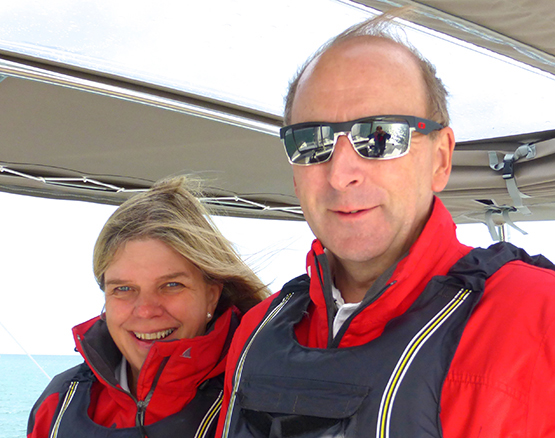 Cathy MacAleavey and Con Murphy Photo: WM Nixon
Cathy MacAleavey and Con Murphy Photo: WM Nixon
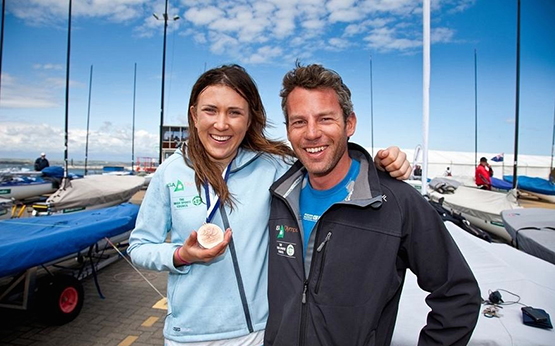 The journey is under way – Annalise Murphy with her longtime coach Rory Fitzpatrick in 2012. Photo courtesy NYC
The journey is under way – Annalise Murphy with her longtime coach Rory Fitzpatrick in 2012. Photo courtesy NYC
But as everyone knows, having been in Gold Medal position in the Women’s Laser Radial at mid-series in the 2012 Olympics, she had it all snatched way by a matter of seconds at the finish of the Medals Race. Until then, a fourth for Ireland in an Olympic event would have been regarded as a major achievement. But there was no disguising the abject disappointment, and it took her maybe six months to get back on an even keel and re-align her sailing targets towards Rio de Janeiro 2016.
It was a daunting prospect, as Rio is notorious for often hyper-light and almost always flukey winds in the sailing waters close in under the steep coastlines and many buildings. But Annalise is known as “Queen of the Breeze”, for she’s tall with a very impressive performance in strong winds, and so well able to apply a ferocious righting moment to a hard-driven sailing dinghy that her colleagues and opponents in the Lasers often refer to her simply as “The Lever”.
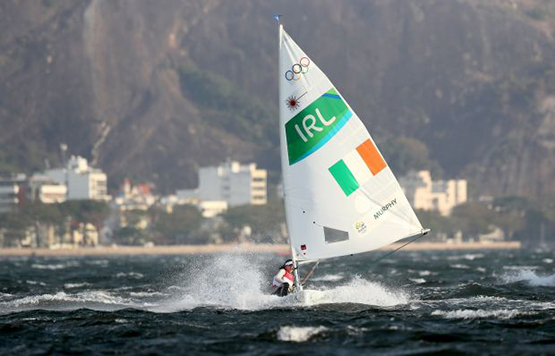 Murphy’s Weather…..but when the breeze built up at the first attempt to stage the Medals Race in Rio on Monday, it became so strong that racing had to be postponed until Tuesday. Photo: World Sailing
Murphy’s Weather…..but when the breeze built up at the first attempt to stage the Medals Race in Rio on Monday, it became so strong that racing had to be postponed until Tuesday. Photo: World Sailing
For someone of this build, Rio de Janeiro’s reputation made it seem the sailing venue from hell. But she determinedly got herself out there as much as possible. Between 2013 and the 2016 Olympiad, she made no less than nine visits, with several of them of extended duration, so much so that by early 2016 there were few non-Brazilians who knew the racing area better.
Yet the strain of keeping up the Brazilian side of the programme while continuing to take part in events of appropriate international standard all over the world was taking its toll. Though she won Ireland a place in the Olympic Women’s Laser Radials for 2016, and then successfully saw off a challenge for that place to go to another sailor, there was no disguising her frustration at her own performance.
It reached a nadir in May 2016 at the Worlds in Mexico, when she finished 39th in a fleet of 71 boats in which she found herself sailing the final races in the Silver Fleet while the sailors with whom she was accustomed to being in top contention, such as Paige Railey of the US, Anne-Marie Rindom of Denmark, Marit Bouwmeester of The Netherlands, Lijia Xu of China, Gintare Scheidt of Lithuania and Alison Young of GB, were out of sight up at the head of the Gold Fleet.
Some day we’ll get the full story of what happened during those next ten weeks to turn the Annalise Murphy story around, to change her from a loser in Mexico in May to a winner in Rio in August. Her support team never gave up on her, and her longtime coach Rory Fitzpatrick and ISA Performance Director James O’Callaghan added extra elements to the programme, including more intensive involvement with the legendary “coach of coaches”, Gary Keegan of the Institute of Sport.
It was a time of psychological and physical challenge, and while her psychologist Kate Kirby was a tower of strength, it was the challenge of “Re-shaping Annalise” for Rio which became central to the plan, for you’d guess that if she still felt she was too heavy for the average conditions in Rio, then she’d start most races with an inbuilt psychological disadvantage.
Rapid weight loss while maintaining peak fitness is not for the faint-hearted, but the Murphy household gave full support by taking all carbs out of the kitchen. Out in Rio meanwhile, it was decided that staying in the Olympic village itself was a calorie hazard, so an AirBnB setup was secured near the sailing base, an arrangement which scored highly on so many points, including maximising diet and nutrition, that you wonder more teams didn’t take this approach.
All this was taking place with the new addition of a key member to the Murphy team. When Annalise missed out so publicly on a medal back in 2012, one of those who shared her disappointment was the New Zealand Women’s Laser sailor Sarah Winthers. Despite having placed 20th overall in 2012, she was completely taken up by the Olympic thing, and devoted her life for the next four years to securing the place in Rio 2016, in which she duly succeeded.
But by this time the New Zealand sailing authorities were applying the same ruthless approach as the British, and they ruled that anyone who failed to get into the top ten in their class’s last world championship before Rio 2016 would not be entitled to take up his or her place.
Sarah Winthers placed 11th in the Laser Worlds in Mexico in May 2016. It was so close that many in the New Zealand sailing community assumed the rules would be stretched. But on the contrary, even an appeal by Winthers to New Zealand’s Sports Tribunal was rejected. New Zealand was not to be represented at all in the 37-strong Women’s Laser Radial fleet in Rio. If some Kiwi tabloids had themselves a bit of righteous indignation about Winthers being left out in the cold, it meant that one hyper-keen sailor found herself lacking a purpose in life when she’d hoped to be preparing for the series she’d dreamt of, for she’s of compact build and Rio’s average sailing conditions might have been devised with Sarah Winthers in mind.
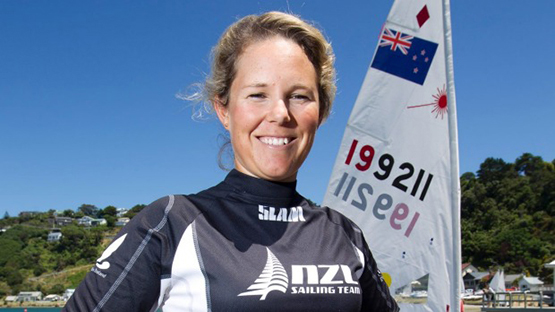 New Zealand sailor Sarah Winthers joined the Murphy team as sailing partner and support coach for the final countdown programme in May, June and July
New Zealand sailor Sarah Winthers joined the Murphy team as sailing partner and support coach for the final countdown programme in May, June and July
But in fact, it may well be that Sarah Winters true vocation is as a coach. For in a very short space of time after rejection by the New Zealand authorities on May 31st, she’d somehow or other become part of the Annalise Murphy team as training sailor and support coach at a time when she could bring something absolutely game-changing to the campaign.
The Murphy camp in its broadest sense was a very happening place in June and July. The weight loss went so well that while conservative reports put it at 7.5 kilos, the word on some grapevines was it might have been as high as 10 kilos in six weeks. Yet thanks to the shared focus and the new intensive sailing programme pacing with Sarah Winthers, Annalise somehow managed to transform herself into a new ultra-slimline version while becoming if anything fitter than ever, and she was very fit to begin with.
Yet it was all kept under wraps. Even public participation in a pre-Olympic series in Rio in July was quietly dismissed as irrelevant, although Annalise was the winner. But it was her final appearance back in Dublin, at the end of July before she returned to Rio for the main event, which made it clear that something sgnificant had happened.
She was in very good form, comfortable with herself and her mind in a good place, and she committed to expectations of being at least in the top eight with a serene confidence which quietened the press gathering, and left everyone with an unmistakable feeling of hope.
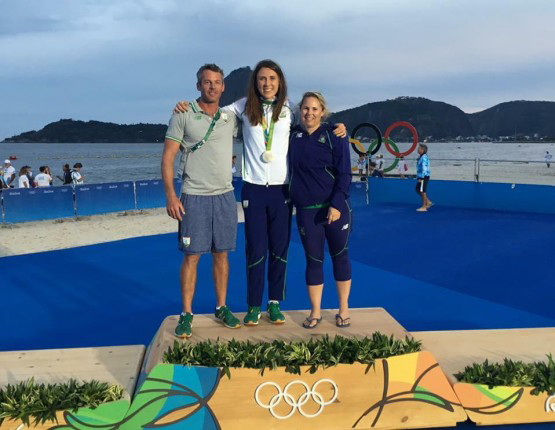 Job done. Rory Fitzpatrick, Annalise Murphy and Sarah Winthers on the Olympic podium.
Job done. Rory Fitzpatrick, Annalise Murphy and Sarah Winthers on the Olympic podium.
Thus there was an impressive amount of effort by a very large number of people going into the Murphy 2016 Olympic Challenge as it got under was on Monday August 8th, and she duly rewarded them by winning the first race with Evi van Acker of Belgium second and Lijia Xu of China third. But for seasoned observers there was a feeling of Groundhog Day about it, as we’d had similar scenarios with the same people back in 2012, yet that went pear-shaped.
And the series by no means proceeded totally smoothly, even if Annalise was generally remarkably consistent, for a 17th in Race 7 had to be carried as surely as several top five places. Yet somehow it all panned out, and by the medals race she was lying third overall knowing she’d to get no worse than fifth to retain that Bronze Medal.
It was a short race, but an awful lot happened in it. Top scorers such as Marit Bouwmeester of the Netherlands and Anne Marie Rindom tended to be in the leading bunch initially, and AnnAlise paced with them, but the at mid-race the other side of the course became favoured and she somehow managed to transfer herself into the other group in a good position, indeed for a crazy 15 seconds there was a possibility of Gold if everyone stayed in the same relative placings.
But in Rio sailing, nothing stays the same for more than two or three seconds, and the final run found Ireland’s hope coming down the middle trying to cover both groups, with the boats on the left making ground with a local freshening. Annalise got herself into contact with them, and it was her rounding of the final mark, a turn to port with a quick close reaching dash to the finish line, which showed her genius.
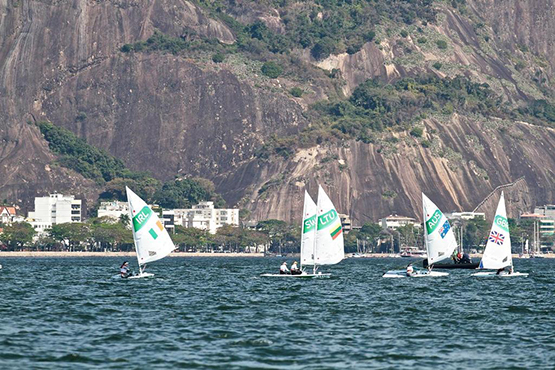
The way it was panning out, the entire group on the left might have swept over her. The worst scenario was that this would leave her so dead in the water that the other group over on the right, with Bouwmeester and Rindom amongst them, may have been trailing for the time being, but showed every sign of coming up with a new breeze, and they in turn could make mincemeat of Irelands hope’s before Murphy had got going again.
She had to engage with the group on the left for some clever mark rounding, for Evi van Acker was zooming up out beyond them, and any errors in Murphy’s management of the mark rounding could see the Belgian making a real challenge. Annalise stayed as cool as you please. She let the leading three boats – none of them of any significance in the overall rankings – go through cleanly, and meanwhile concentrated on shepherding Gintare Scheidt rather closer to the mark in her approach than the Lithuanian might have liked.
In other words, Gintare Scheidt (she’s wife of the Brazilian sailing hero) ran too close past the mark to make a neat rounding, and there was a gap left after she hardened up. Murphy on port meanwhile had been too busy keeping clear of Evi van Acker running down fast on starboard to take up any chance of challenging Scheidt directly, but when she did come to the mark a couple of seconds later, the gap was still there, and Annalise could sail straight to the finish with Scheidt clear under her lee bow and in no way interfering with the Irishwoman’s airflow.
It all sounds so simple. But in mark rounding like this, there’s such a re-shuffling of the pack that two or three places can disappear in as many seconds. Yet Annalise kept her cool and as she came to the line in a sold fifth, it was to realise that she might be looking at silver, for although Rindom, van Acker and Gold Medal winner Bouwmeester were now sweeping towards the line at speed, Annalise Murphy’s race was run, and the Silver Medal was her’s.
Everybody went crazy, and for a while the Danish Bronze Medal boat and the Irish Silver Medal boat were capsized and entwined while their helms swam in that supposedly polluted Rio sea, and the cheers rang out from the Irish contingent on the beach. Somebody even suggested that the boat which had borne Annalise Murohy so gallantly to a Silver Medal might just be left for somebody else to collect, but eventually the two were reunited and in what was now a lovely summer’s evening breeze, the Dane and the Irish girl sailed side by side back to the shore and rapturous welcomes.
So now, what happens to the boats? They were issued fresh from their wrappings to the competitors a few days before the games started. Presumably they’ll go to some deserving cause such as a local youth sailing club? But if nobody’s too sure, how about bringing Annalise’s Rio Laser home for permanent display in the National Maritime Museum? It could usefully show visitors one of the greatest sailing dinghy designs of all time, and it would commemorate a great Irish sailing success. Then too, it would be very useful to have that little boat around the place when the National Yacht Club (founded 1870) celebrates its Sesquicentennial in 2020, when we can only hope that Irish sailing will be having as good a time at the Tokyo Olympics, seeking fair play for a minority sport from a small country, as they did in Rio.
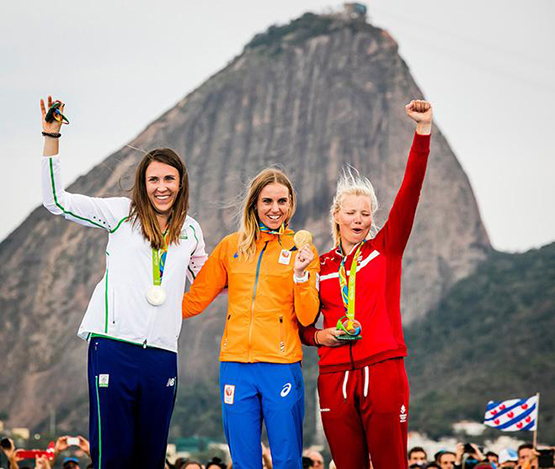 It really did happen….Annalise Murphy (Silver), Marit Bouwmeester (Gold) and Ann-Marie Rindom (Bronze)
It really did happen….Annalise Murphy (Silver), Marit Bouwmeester (Gold) and Ann-Marie Rindom (Bronze)
Annalise Murphy Sends Thanks from Rio for 'Amazing Support'
The National Yacht Club sailor, Annalise Murphy from Dun Laoghaire, who overcame heartbreak in London 2012 to take a silver medal in Rio on Tuesday has been thanking suporters via her Facebook page. In a typical warm but modest fashion the Olympic silver medallist says: 'Wow I don't really know what to say! This is a dream come true, not only for me but for everyone who has helped me get to this point over the last 8 years! Thank you everyone for all the amazing support, it means the world to me! Still in shock but so proud to be Irish! X Annalise'.
She is pictured on the podium with her coaches Rory Fitzpatrick and Sara Winthers who she credits with so much of her success.
Annalise Murphy's journey has been charted in a unique photo review by the Irish Times this morning here
Her road to silver success was profiled in the newspaper yesterday by correspondent David O'Brien here.



























